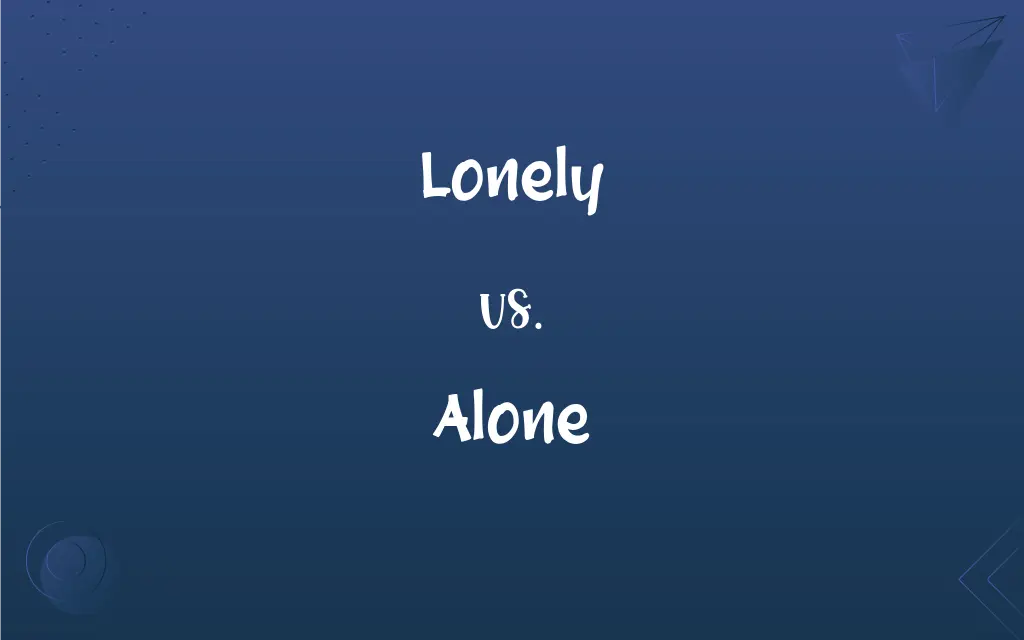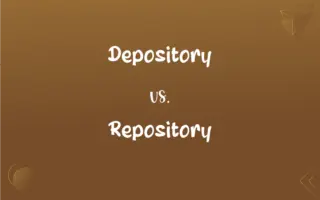Lonely vs. Alone: What's the Difference?
Edited by Janet White || By Harlon Moss || Published on November 29, 2023
Lonely implies feeling isolated or desolate, whereas alone denotes being by oneself without company.

Key Differences
Lonely and alone, though frequently interchanged, hold distinct nuances in the English language. The term "lonely" primarily describes an emotional state of feeling isolated, deserted, or desolate, even if one is surrounded by people. On the other hand, "alone" is a straightforward term that describes the state of being by oneself, without the presence of others. Interestingly, it's possible to be alone without feeling lonely. A person might cherish solitude and find peace in being alone, without experiencing feelings of loneliness. Conversely, one might be surrounded by people or even be in a crowded place and still feel incredibly lonely. This divergence reveals the depth of "lonely" as an emotional sentiment and "alone" as a physical circumstance.
While "lonely" carries a predominantly negative connotation, indicating a longing for company or connection, "alone" is more neutral. Being alone can be a conscious choice, a moment of solitude, or a necessary condition at times, and doesn't always suggest a negative state of being. In contrast, "lonely" is inherently associated with feelings of sadness or melancholy.
In literature and everyday speech, the use of "lonely" and "alone" can have profound effects on the message being conveyed. Describing a character as "lonely" immediately creates an emotional undertone, hinting at a deeper internal struggle. Meanwhile, stating a character is "alone" is more observational, indicating their solitude without delving into their feelings.
Comparison Chart
Emotional vs. Physical
Describes an emotional state.
Describes a physical state.
Connotation
Negative, denotes sadness.
Neutral, can be positive or negative.
ADVERTISEMENT
In Presence of Others
Can feel lonely even among people.
Indicates absence of others.
Volition
Often not a choice; involuntary emotion.
Can be a conscious choice.
Use in Grammar
Adjective describing a feeling or state of mind.
Adjective or adverb indicating solitude.
Lonely and Alone Definitions
Lonely
Feeling sad because one has no company.
She felt lonely in the big city.
Alone
Separated from others.
He went out alone at night.
ADVERTISEMENT
Lonely
Lacking companions or companionship.
The only house on the street looked lonely.
Alone
Being the only one.
She was alone in the room.
Lonely
Isolated, remote, or desolate in character.
The lonely tower stood atop the hill.
Alone
Exclusive of anyone or anything else.
Based on the evidence alone, he was guilty.
Lonely
Producing a feeling of bleakness or desolation.
It was a lonely stretch of road.
Alone
Without equal or peer.
In terms of talent, she stands alone.
Lonely
Not frequented by human beings.
The beach is lonely in the off-season.
Alone
Without anyone or anything else.
The responsibility rests alone with him.
Lonely
Dejected by the awareness of being alone.
Alone
Being apart from others; solitary.
Lonely
Producing such dejection
The loneliest night of the week.
Alone
Being without anyone or anything else; only.
Lonely
Without others of a similar kind; lone; solitary
"a lonely band of lawyers up against the might of the American legal establishment" (Nick Kotz).
Alone
Considered separately from all others of the same class.
FAQs
Is "lonely" an emotion or a physical state?
"Lonely" is an emotion, often linked with sadness or isolation.
Can you feel lonely in a crowd?
Absolutely, loneliness is an emotional state and can be felt even among many people.
Can someone be alone without feeling lonely?
Yes, being alone refers to the absence of others, but one can be alone without feeling isolated.
What's the primary grammatical function of "lonely"?
"Lonely" is predominantly used as an adjective.
Can animals experience loneliness?
Yes, many animals are social creatures and can experience feelings akin to loneliness.
Can a decision be made "alone"?
Yes, making a decision "alone" implies doing so without input from others.
Is there a synonym for "lonely" that doesn't carry a negative connotation?
Not precisely, as most synonyms (e.g., "isolated," "forlorn") carry similar sentiments.
Can one be "alone" in thought?
Yes, "alone" in thought implies being deeply engrossed or singular in one's contemplation.
Does being "lonely" always require a remedy?
Not always, as some moments of loneliness can be brief or even introspective.
Is "lonely" only used to describe people?
No, "lonely" can describe places, objects, or even periods of time.
Does "alone" always carry a negative connotation?
No, "alone" is neutral and can refer to simple solitude without negative implications.
Can "lonely" and "alone" be used interchangeably?
Though sometimes used interchangeably, they have different nuances. "Lonely" is emotional, while "alone" is physical.
Can choosing to be alone lead to loneliness?
It can, but solitude (being alone) doesn't inherently cause loneliness.
Are there positive aspects of being alone?
Yes, being alone can offer solitude, reflection, and a break from social stimuli.
Is there a link between prolonged periods of being alone and feeling lonely?
Prolonged solitude can lead to loneliness, but it varies from person to person.
Can one combat feelings of loneliness without seeking company?
Yes, through activities, hobbies, or even virtual social interactions.
How can someone describe a place as "lonely"?
A "lonely" place often feels remote, desolate, or seldom visited by people.
Is "lonely" always linked to sadness?
Predominantly, "lonely" carries a connotation of sadness or a desire for company.
How about "alone"? What's its primary grammatical function?
"Alone" can function as both an adjective and an adverb.
Are there phrases where "alone" doesn't mean solitude?
Yes, such as "let alone" which means "not to mention."
About Author
Written by
Harlon MossHarlon is a seasoned quality moderator and accomplished content writer for Difference Wiki. An alumnus of the prestigious University of California, he earned his degree in Computer Science. Leveraging his academic background, Harlon brings a meticulous and informed perspective to his work, ensuring content accuracy and excellence.
Edited by
Janet WhiteJanet White has been an esteemed writer and blogger for Difference Wiki. Holding a Master's degree in Science and Medical Journalism from the prestigious Boston University, she has consistently demonstrated her expertise and passion for her field. When she's not immersed in her work, Janet relishes her time exercising, delving into a good book, and cherishing moments with friends and family.








































































